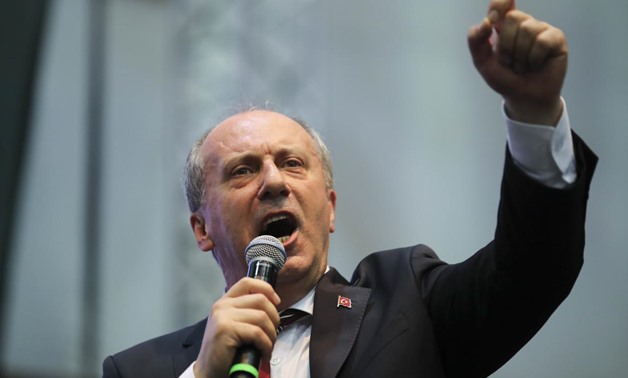
Muharrem Ince, Turkey's main opposition Republican People's Party (CHP) candidate for the upcoming snap presidential election, gestures as he speaks during a party gathering in Ankara, Turkey, May 4, 2018. REUTERS/Umit Bektas
ANKARA - 6 May 2018: The presidential candidate for Turkey’s main opposition has hit out at a lack of mainstream media coverage for opposition parties and candidates before elections in June.
Muharrem Ince, the main opposition Republican People’s Party’s (CHP) candidate to challenge President Tayyip Erdogan in the June 24 snap elections, said a “media embargo” had been placed on opposition parties upon Erdogan’s request.
“Television channels, which even broadcast the AK Party’s provincial congresses live, did not show our rally in Yalova live. We will go on by fighting with this media structure,” Ince said on Twitter on Sunday.
“If the media embargo ordered by the Palace continues, we will hold our rallies in front of TV stations,” he said, referring to the 1,000 room presidential palace built by Erdogan in Ankara.
Neither Erdogan nor the AKP have responded directly to claims that coverage of the opposition is being curbed.
Turkish media is saturated with coverage of Erdogan and his ministers, with the president’s daily routine of two or three speeches being broadcast on all major channels, while opposition parties get little to no coverage.
Rallies by the CHP, pro-Kurdish Peoples Democratic Party (HDP) and the fledgling Iyi (Good) Party, led by former interior minister Meral Aksener, are rarely shown by the main broadcasters.
On Friday, the HDP streamed the nomination of its jailed former leader Selahattin Demirtas as a presidential candidate on social media when broadcasters ignored their announcement.
On April 18, Erdogan called parliamentary and presidential elections for June, more than a year early, to switch to a powerful executive presidency narrowly approved in a referendum last year.
Broadcasters were also criticized ahead of last year’s referendum for giving a disproportionate amount of coverage to political parties, despite Turkey’s radio and television watchdog (RTUK) having the authority to monitor air times.
Erdogan, a masterful campaigner who has ruled Turkey for 16 years, will go into the elections under a state of emergency, which has been in place for nearly two years.
Emergency rule was imposed shortly after a failed coup in 2016, and allows the president to bypass parliament in enacting new laws and grants authorities the ability to suspend rights and freedoms.
A sweeping crackdown in the aftermath of the abortive putsch has seen some 160,000 people detained and nearly the same amount of people dismissed from the jobs, the United Nations said in March.
More than 120 journalists have been detained and more than 180 media outlets have been closed under emergency rule, rights group Amnesty International has said. Reporters Without Borders (RSF) ranked Turkey 157th out of 180 countries in its 2018 press freedom index.
In his first interview with international media since being nominated, HDP leader Demirtas, who has been in jail on security charges for a year and a half, told Reuters a fair election was impossible under the state of emergency.
Ince has called for the release of Demirtas, challenging Erdogan to “let us race like men” in the campaign.


Comments
Leave a Comment